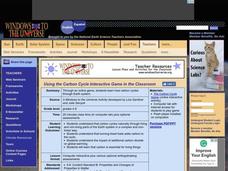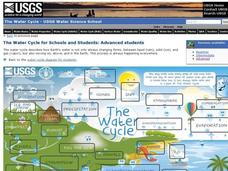Baylor College
Fossil Fuels and the Carbon Cycle
Humans are quickly depleting Earth's fossil fuels and locating them is becoming increasingly difficult! Layered muffins are used for models as young geologists take core samples in order to determine the presence of oil. Consider first...
Curated OER
The Hydrologic (Water) Cycle
Learners construct a model of the hydrologic cycle, and observe that water is an element of a cycle in the natural environment. They explain how the hydrologic cycle works and why it is important, and compare the hydrologic cycle to...
Curated OER
Using the Carbon Cycle Interactive Game in the Classroom
An online reading and interactive game bring the path of a carbon molecule to life for your earth science explorers! As an assessment, learners can map out or write about their experience in the carbon cycle. Thoroughly written...
Curated OER
"Lettuce" Learn About the Water Cycle
Young scientists investigate the water cycle through a lettuce seed experiment. For this experiment, learners plant lettuce seeds inside of a ziplock bag in order to create a small greenhouse. They observe condensation and precipitation,...
Saint Louis Zoo
Introduction to Natural Selection: Darwin & Lamarck
Charles Darwin and Jean Baptiste Lamarck are credited for developing the theory of natural selection. After teaching your beginning biologists about acquired characteristics, they read the included selection and answer questions that...
US Geological Survey
The Water Cycle for Schools: Advanced Ages
Explore the water cycle in an interactive diagram of the process. The diagram shows how water is a moving system and constantly changing forms. The resourc includes vocabulary words that pupils click on in order to discover more about...
Curated OER
Life Cycle of the Plant - The Pumpkin
First graders access prior knowledge about pumpkins and read the story Pumpkin, Pumpkin. They will sequence the life cycle of the pumpkin through the use of picture cards and then sing a song about the life cycle of the pumpkin and plant...
Curated OER
Understanding the Water Cycle
Investigate the water cycle and how water moves from the land to the air and back to the land. Create a terrarium and observe the water cycle at work. Define weather terms including evaporation, condensation, and precipitation.
Curated OER
Water Cycle
Identify and interpret the earth's different water sources. Third and fourth graders describe and demonstrate the process of the water cycle, make a model of its two main parts, and predict and infer to answer questions about the model.
Curated OER
The Life Cycle of a Butterfly
A well-designed instructional activity on the life cycle of the butterfly is here for you. In it, young scientists spend 45 minutes a day, for one school week, engaged in their study. They take nature walks, participate in activities in...
Curated OER
Changes in Nature
The goal of this science lesson is to have youngsters be able to identify the physical and chemical changes in the carbon cycle, and water cycle due to weathering. The in-class inquiry/experiment is quite interesting and easy to...
Teach Engineering
Life Cycles
Breathe some life into product design. Pupils learn about the stages of product creation, use, and disposal—sometimes called a cradle-to-grave assessment. They see how this cycle relates to the life cycle of organisms.
Curated OER
Water Cycling in the Wilderness: Alaska quarter reverse
The Alaskan wilderness contains every imaginable element of the water cycle: it has flowing streams, cool spring rain, and frozen glaciers. Pupils use a series of worksheets to identify and define evaporation, condensation, and...
Curated OER
The Water Cycle
Your class sets up a mini water cycle model to examine the process. Then they watch an animation, following a water molecule through the cycle. A well-developed lab sheet guides learners through the lesson and a PowerPoint presentation...
Curated OER
Water Cycle Reading and Writing
After listening to a story about the water cycle, learners create their own versions of this tale. This is a great way to have your class review the concepts of evaporation, condensation, precipitation, and runoff.
Curated OER
Water Cycle Reading and Writing
Here is a great way to get pupils to express a scientific concept in a fun way. After hearing the story of Walter the Water drop and learning facts about the water cycle, the class will write a creative expository piece describing what...
Curated OER
What Is Natural?
Your junior highers will learn about which objects are natural and classify objects as abiotic or biotic. Your class will trace human products to their natural resources using matter cycles and then create their own definition of nature.
Curated OER
Cycles and Starting Mealworms
Here is a fascinating lesson about the life cycles of plants and animals, and other cycles found in nature. Learners explore the cycle of the moon, the tides, and other sequences of events in every day life. The big activity is the...
Curated OER
Moebius Strips
Students make Moebius strips and use them to demonstrate the interconnectedness of an environment. They explore the natural cycles (water, oxygen/carbon dioxide, carbon, nitrogen) within the environment. They describe how the cycles are...
Chicago Botanic Garden
Greenhouse Gas Emissions — Natural and Human Causes
What impact do humans have on greenhouse gas emissions? What are the natural causes of these gasses? Thanks to the carbon cycle, carbon dioxide eats away at the earth's atmosphere with the intensified help of humans. Young scientists...
Chicago Botanic Garden
The Carbon Cycle
There is 30 percent more carbon in the atmosphere today than there was 150 years ago. The first lesson in the four-part series teaches classes about the carbon cycle. Over two to three days, classes make a model of the cycle, add missing...
Virginia Department of Education
The Hydrologic Cycle
There is the same amount of water on earth now as there was when it was formed. The water from your faucet could contain molecules that dinosaurs drank! Young scientists build their own hydrologic cycle model and observe it for five...
Outside Education
Water Cycle Adventure
Evaporation, transpiration, condensation, precipitation, accumulation. Steam, clouds, rain, lakes. Guide your class members on an imaginary journey through the water cycle with a water cycle adventure script.
It's About Time
The Nitrogen and Phosphorous Cycles
How do we affect the ecosystem, and what can we do to preserve it? Pupils explore chemicals that promote and inhibit plant growth, then discuss the importance of nitrogen and phosphorus to the survival of organisms and describe how...
Other popular searches
- Natural Cycles of Earth
- Natural Cycles Science
- Comparing Natural Cycles
- Natural Cycles and Patterns
- Natural Cycles in Ecosystem

























